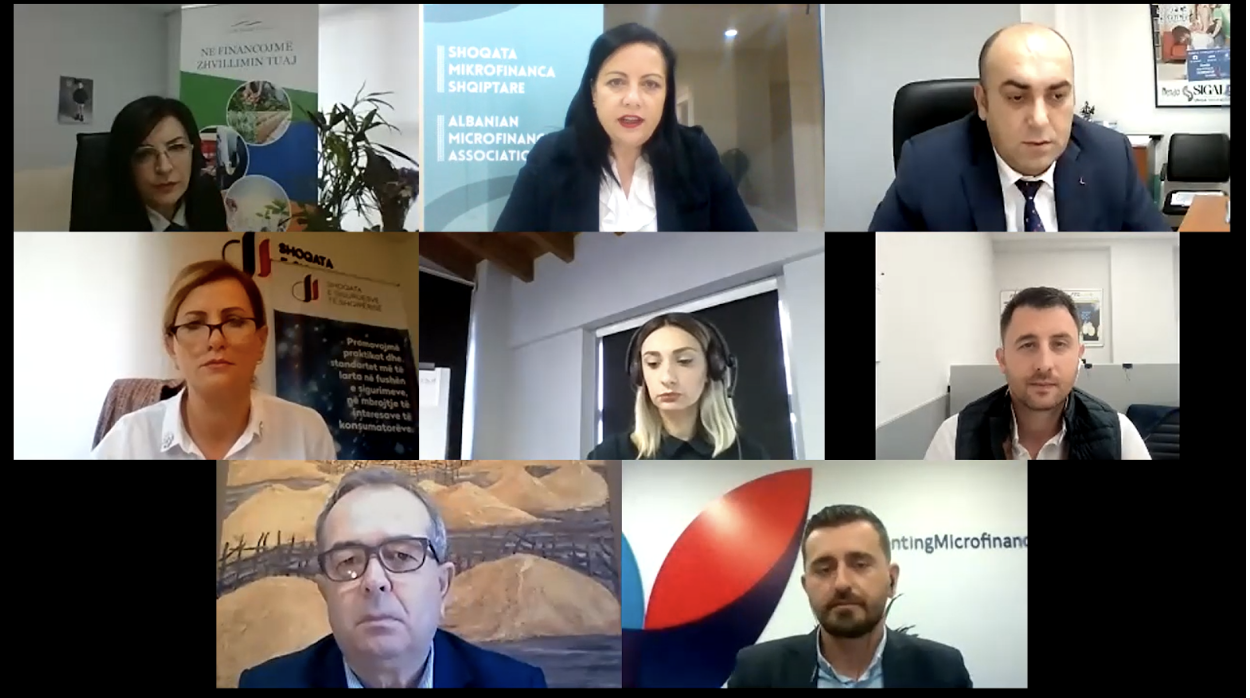INNOVATIVE MICROFINANCE PRODUCTS AND SERVICES
INNOVATIVE MICROFINANCE PRODUCTS AND SERVICES
by: AMA
October 28, 2021

Agricultural innsurance products and the challenges of introduction in the Albanian market
The Albanian Microfinance Association, with the support of the Microfinance Center (MFC) and the financing of the European Union under the Program for Employment and Social Innovation (EaSI), organized a roundtable discussion on “Innovative Products and Services in Microfinance”, which addressed the topic of delivery of insurance products in agriculture and the challenges of their introduction in the Albanian market. Invited to this roundtable were representatives of non-bank financial institutions, which are active in agricultural lending, senior representatives of the sector and independent experts. Agim Rrapaj, Chairman of the Albanian Agribusiness Council and Mr. Ilir Pilku, Studio ASF, representatives of the insurance market as Mrs. Mimoza Hajdarmataj, Secretary General of the Insurers Association and Mr. Ogert Shkrepa, Director of the Assets and Guarantees Department at SIGAL UNIQA Group etc.
The first panel of this discussion presented information about the activity of microfinance institutions in support of agricultural development, the challenges faced by the sector during the pandemic crisis but also the strength it showed by not interrupting lending for any moment. In this panel was also discussed the strategic position of institutions towards agriculture, given the importance of this sector in the economic development of the country and the supply of the food chain. In this context, member institutions still have to do to increase coverage with products and services in terms of geographical areas, but also further specialize the sales force in providing non-financial advisory services and technical assistance to farmers.
This discussion started with Fatmir Nikolli from NOA sh.a., who made an introduction of agriculture financing activity during the lockdown and the later pandemic phases. He stressed that the financing to farmers was not interrupted at any moment, although the sector indirectly was impacted by the pandemic, due to its close relations to consumption and tourism. He also mentioned that farmers were facilitated with debt relief actions and loan rescheduling in order to ease the burden of a difficult year. He suggested that the focus should be maintained to agro-financing, especially to meet farmers liquidity needs.
Vjollca Mucaj from Agro & Social Fund made an introduction of the efforts coming from this institution to support the rural community, especially the rural women and their efforts to support their families. She stressed that the products addressed to farmers are designed taking into consideration the risk typologies and the profile of the customer. Furthermore, the geographic distribution of the lending activity is addressed in particular areas that have a focus at large in agriculture, such as apple cultivation, vegetables and other products that are also prepared for export.
Valbona Dogu from AgroKredit stressed the fact that the lending activity to farmers, which is the main business line of this institution, was not interrupted and was adjusted to the new reality imposed by the pandemic. She presented a series of innovative products that have been introduced, including those partially financing investments supported by IPARD II or state subventions. She presented the issues with the portfolio quality as a result of the pandemic, and also the way how these issues were handled.
When asked about the innovation and digital transformation in agri-business, the participants expressed the goodwill not only to provide digital services, but also to support the farmers with digital literacy and the required tools in order to use the current information sharing platforms and offering of non-financial services through digital channels.
Mr. Ilir Pilku, well known expert from agriculture industry, expressed his views on microfinance activity in support to farmers, from a different angle. He said that there is still a lot of room for microfinance products and services penetration in the farmers database, constituting of more than 350 thousand farmers. He said that the current rural population today is pushed to poverty and is more and more subject to emigration, so immediate measures should be taken by actors to support this cluster that constitutes of about 19% of national GDP. He said that microfinance needs to take a strategic “key leader” approach, in order to address these issues and become a real support to farmers and rural communities. He also said that more investment in human resources dealing with agro-lending should be implemented, in order to increase their capacities and make them more independent in providing swift decision making for these typologies of transactions.
In the second panel the focus shifted to the products and services offered to the market today, as well as the challenges faced by the sector in relation to the lack of formalization of farmers and their various groups in terms of production and paying capacity. The need for cooperation and joint contribution to agriculture was also underlined by all groups set up in support of it.
Mr. Agim Rrapaj, Chair of National Agrobusiness Council, underlined the structuring of agricultural market, being composed of three main groups: the majority of individual farmers, working for themselves and not formalized (around 80% of land ownership), the farmers that are formalized and work for their families, but also sell some products to accumulation points, and the main agribusiness entities (farmers, agro-tourism, agro-processing, and wholesale agro-product traders), which are mostly customers of the banking sector. He stressed out that microfinance has continuously supported the first two groups, albeit the risk that they represent, and that during the pandemic the farmers were supported with no additional costs charged by MFI-s.
He said that the level of informality remains an issue that negatively impacts all developments in the sector. A lot of the cultivated product, due to the difficulties in the supply chain, comes bad and gets wasted, since there is not an organized effort to send it to the consumer table. In this dimension, taking into consideration also the frequent weather disasters, he maintained that the farmers should be presented with insurance alternatives, and that the market actors should cooperate to present to the Government a proposal for budgeting subventions to partially cover the insurance premiums.
Ms. Mimoza Hajdarmataj from Insurers Association of Albania and Mr. Ogert Shkrepa, Head of Property and Asset Insurance at SIGAL UNIQA GROUP AUSTRIA, both expressed their willingness into providing the proper assistance and cooperation to offer insuring products to farmers. Mr. Shkrepa said that SIGAL has a full range of insuring products not only for the agricultural product, but for each stage of production, but he said that these products have not been absorbed by the market due to their costs and the low educational level of the market. In this dimension, he said that they are ready to join efforts with microfinance sector, to try and push the product to their market.
Finally, Mr. Rrapaj proposed to draft a study with the contribution of MFI-s, which will estimate the damage and impact in current loan portfolios related to natural disasters, and also the total amount that the state is paying for indemnity in the case of such disasters. If the study will show that this amount is much higher than the amount of insurance premiums that will be submitted to the government for subventions, this will be a strong case study for starting to offer the insurance products to farmers.
The participants widely discussed and agreed on the continuation of cooperation for the creation of a coordinated alliance, with the participation of state institutions, which will help provide cost subsidy schemes for insurance premiums, based on the benefits offered by insurance schemes. insurance. and significant cuts in state funds used to compensate farmers in the event of disasters.

